At 6 am Wednesday, I woke up in a mosquito net alongside hundreds of earthquake victims near the moat of Mandalay Palace.
周三早上6點(diǎn),我和成百上千的地震災(zāi)民一起,在緬甸曼德勒大皇宮護(hù)城河邊醒來。
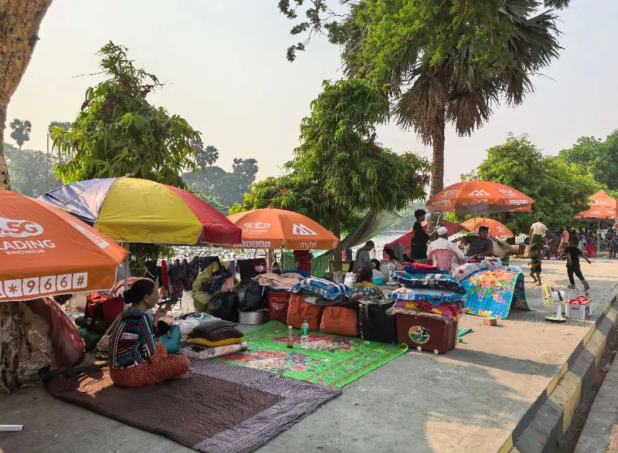
The Chinese rescue teams were already hard at work, with generators humming and vehicles bustling. Food and water had been quietly placed outside people's mosquito nets, likely brought by local volunteer organizations or individuals in the early hours of the morning.
附近的中國(guó)救援隊(duì)已經(jīng)陸續(xù)開始工作,發(fā)電機(jī)和車輛發(fā)出轟鳴聲。蚊帳外早已堆起了食物和水,應(yīng)該是民間救援組織或個(gè)人一早默默送來的。
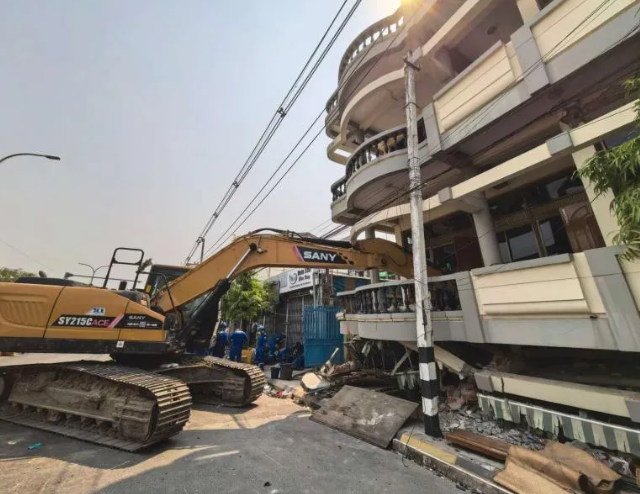
Across the street, an elderly woman in her 80s has been trapped for over four days. The dedicated volunteers from the Blue Sky Rescue team have been tirelessly digging for two days and nights in hopes of finding her alive. Last night at midnight, I overheard them discussing their next steps for the excavation.
馬路對(duì)面,一位80多歲的老奶奶被埋已經(jīng)超過4天了,為了一線生存希望,中國(guó)藍(lán)天救援隊(duì)的志愿者在這里堅(jiān)持挖掘了兩天兩夜。昨晚12點(diǎn),我還聽到他們討論下一步的挖掘方案。
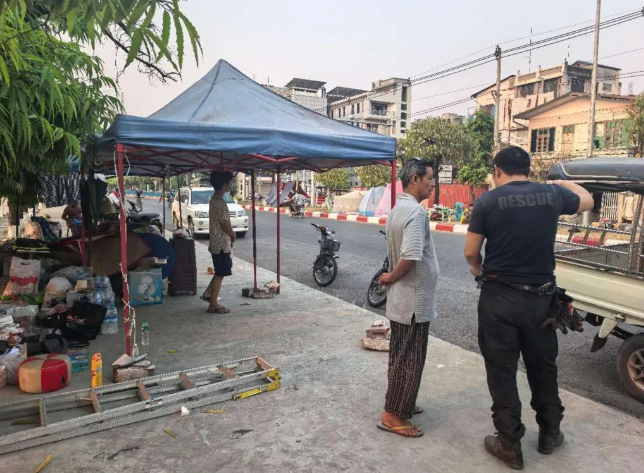
To my left, the elderly woman's son and his family are taking refuge. Upon learning that I was a journalist from China, they kindly brought pillows and blankets to my mosquito net — my temporary residence. As I pen these words, they have even brought us hot fried dough sticks.
在我的左側(cè),是老奶奶的兒子一家。昨晚,他們得知我是中國(guó)來的記者,給我送來了枕頭和毯子。在我寫這篇稿子的時(shí)候,他們又送來了熱油條。
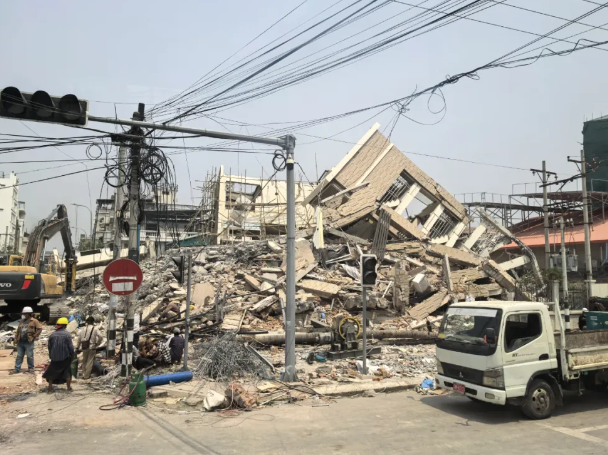
These disaster-stricken individuals may face the loss of generational heritage, potentially leading to months of makeshift camps by the river.
這些災(zāi)民可能會(huì)永遠(yuǎn)失去他們數(shù)輩人攢下的家產(chǎn),也或許要在河邊露宿幾個(gè)月。
However, as the morning sun rises, I observe children playing, residents washing clothes in the river and hanging them on the roadside railings, while many others affected by the earthquake are still asleep.
但在這個(gè)清晨,伴著朝陽(yáng),我看到孩子們?cè)阪覒颍用裼煤铀戳艘路煸诼放缘臋跅U上,也有很多災(zāi)民還在安心酣睡。
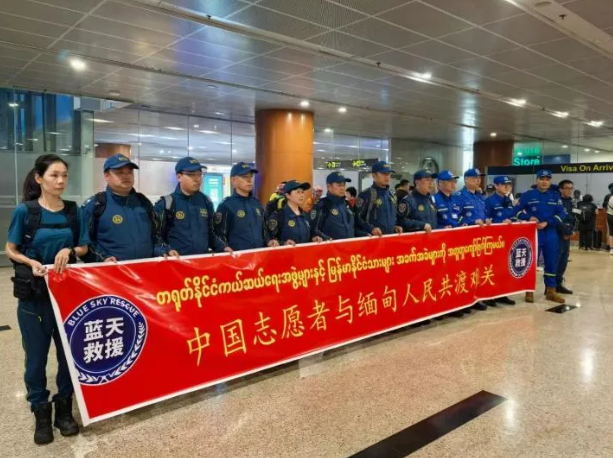
Since my arrival in Yangon on Monday evening, almost 48 hours have passed. I feel ashamed that my videos, photos, and words cannot fully capture all that I have witnessed. It is my hope that this personal perspective can offer you a more first-hand understanding of the situation in Myanmar's disaster-stricken areas.
從我3月31日晚抵達(dá)仰光到現(xiàn)在,已經(jīng)過去差不多48個(gè)小時(shí)了。很慚愧,我的視頻、照片、文字不能傳達(dá)我看到的所有,只希望這篇個(gè)人視角的文字,能讓國(guó)內(nèi)關(guān)心緬甸災(zāi)區(qū)的朋友們,多一些第一視角的認(rèn)識(shí)。
The rescue volunteers didn't even eat the boxed meals prepared for them. They got on the bus directly and traveled overnight for over 12 hours, arriving in Mandalay on Tuesday afternoon. As of last night, more than 110 professional international rescue volunteers from the Blue Sky Rescue team had arrived in Myanmar, with hundreds more from other civilian rescue teams.
救援志愿者們甚至沒有吃早已備好的盒飯,直接上了大巴車,連夜乘坐12個(gè)多小時(shí),在4月1號(hào)中午抵達(dá)了曼德勒。截止昨天夜里,僅藍(lán)天救援隊(duì)就有110多位專業(yè)國(guó)際救援志愿者抵達(dá)緬甸,其他民間救援隊(duì)加起來總共有數(shù)百人已經(jīng)到達(dá)。
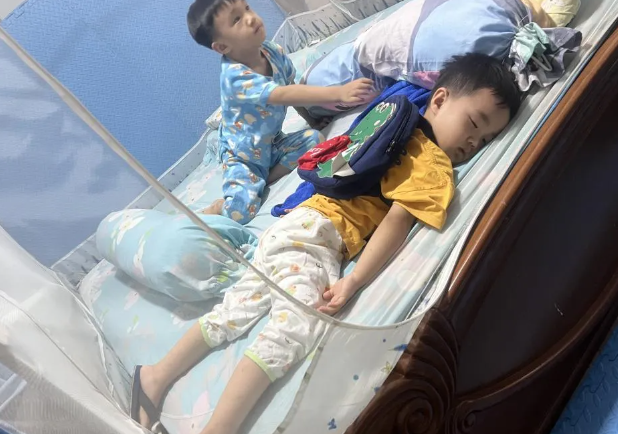
Myanmar's scorching temperatures, exceeding 40 degrees Celsius in Mandalay these days, present challenges for the rescue efforts.
緬甸的溫度較高,這幾天中午曼德勒的氣溫能達(dá)到40多度,給救援工作帶來了很大挑戰(zhàn)。
These days are also a critical period for rescue, with opportunities to find signs of life.
這兩天也是救援的關(guān)鍵時(shí)期,還有找到生命跡象的機(jī)會(huì)。
At this moment, the elderly woman across the street, still trapped, weighs heavily on the hearts of many rescue team members. Their tireless efforts, working for hours on end without rest, also resonate with the local community.
此刻,我對(duì)面仍被掩埋的老人牽動(dòng)著很多救援隊(duì)員的心,而救援隊(duì)員幾十個(gè)小時(shí)不睡覺的忘我工作,也牽動(dòng)了當(dāng)?shù)厝罕姷男摹?span style="text-wrap: wrap;">
After the earthquake, fear gripped the people, prompting them to camp in open spaces overnight rather than stay in their homes. Fortunately, Myanmar's nighttime temperatures are moderate, and the self-sufficient and resilient attitude of the locals has brought a sense of calm to the city post-disaster.
然而,地震后,大家都受到了驚嚇,所以都不會(huì)住在家里,而是到空曠的地方搭帳篷過夜。好在緬甸晚上的溫度也不低,而且當(dāng)?shù)厝俗越o自足、知足常樂的生活態(tài)度為這個(gè)震后的城市增加了不少平靜。
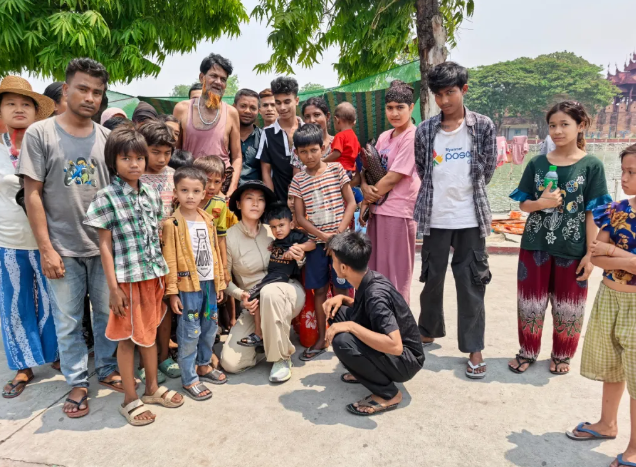
"Dry Cloud" told me that rescue work requires a lot of specialized knowledge depending on the actual situation at each site. For example, if some houses are very fragile and collapse completely during the earthquake, the excavation is simple — the injured can be rescued quickly. But for buildings that have not collapsed and are leaning, extra caution is needed during rescue. Designing excavation plans to avoid secondary collapse and harm to rescue personnel is crucial.
“枯云”告訴我,救援工作根據(jù)每個(gè)點(diǎn)位的實(shí)際情況不同,需要很多的專業(yè)知識(shí)。比如,有些房屋如果本身十分脆弱,就會(huì)在地震中完全坍塌,那么這樣的挖掘是簡(jiǎn)單的,很快就可以救出傷員;但有些沒有坍塌、只是發(fā)生傾斜的建筑,在救援的時(shí)候則需要格外注意,要設(shè)計(jì)挖掘方案、避免二次坍塌傷害救援人員。
記者:閆東潔
英文翻譯:許諾
本文轉(zhuǎn)載自中國(guó)日?qǐng)?bào)網(wǎng),如有侵權(quán),請(qǐng)聯(lián)系我們刪除。











